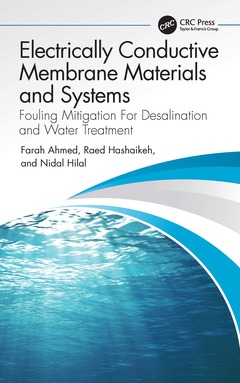Electrically Conductive Membrane Materials and Systems Fouling Mitigation For Desalination and Water Treatment
Auteurs : Ahmed Farah, Hashaikeh Raed, Hilal Nidal

Electrically Conductive Membrane Materials and Systems offers in-depth insight into the transformative role of electrically conductive materials in membrane separation processes for desalination and water treatment. The book focuses on the intelligent design of conductive membranes and systems, fouling and related phenomena, fouling control using electrically conductive materials, and electrically tunable membrane systems for microfiltration, ultrafiltration, nanofiltration, reverse osmosis, and membrane distillation.
With rising concerns around inaccessibility to freshwater and the ever increasing threats of population growth, climate change, and urban development, the book brings electrically conducting materials to the forefront of membrane separation technology with an emphasis on their role in the mitigation of fouling and related phenomena. Electrically conducting materials expand the versatility of membrane technology and ultimately improve access to safe water.
The book is important reading for scientists, engineers, entrepreneurs, and enthusiasts from the water industry who seek to familiarize themselves with a groundbreaking area of study within modern desalination and water treatment.
? Explores novel membrane materials and systems from preparation methods, materials selection, and their application in monitoring, fouling control, and performance enhancement.
? Examines the mechanism of fouling prevention and cleaning in various electrically conductive materials.
? Evaluates the scalability of antifouling materials and coatings, as well as electrically enhanced processes for monitoring and control in membrane separation technology.
? Assesses advantages and limitations of applying electrically conductive membrane systems to fouling control for specific water treatment applications.
? Provides a critical review of scientific literature in the specialized area of electrical conductive materials and systems for membrane technology.
Chapter 1. Introduction to membrane separation processes. Chapter 2. Fouling and related phenomena. Chapter 3. Monitoring, prevention and control of fouling and related phenomena. Chapter 4. Electrical Conductivity in Materials. Chapter 5. Electrically conductive membranes for fouling mitigation. Chapter 6. Electrical conductive spacers for fouling mitigation in desalination and water treatment. Chapter 7. Electrically conductive systems in membrane distillation. Chapter 8. Electrically tunable membrane systems. Chapter 9. Future prospects.
Dr. Farah Ahmed is a research fellow at the Water Research Center - New York University Abu Dhabi. She is an affiliate member at the Mohammed in Rashid Academy of Scientists in the United Arab Emirates. Dr. Ahmed received her doctorate in interdisciplinary engineering from Khalifa University of Science and Technology in 2018. Her research expertise lies in the area of advanced membrane materials for desalination and water treatment, with a focus on emerging low-energy technologies. She has authored many articles in prestigious international journals and book chapters, and delivered invited lectures at various international conferences and institutions around the world. Dr. Ahmed serves on the editorial and advisory boards of a number of journals including Membranes, Separation Technologies, Nature Communications, Energies and Desalination.
Professor Raed Hashaikeh is a Tenured Professor of Mechanical Engineering at New York University-Abu Dhabi and a Member of the Mohammed bin Rashid Academy of Scientists in the UAE. He received his MSc and PhD in Materials Engineering from McGill University in 2000, and 2005, respectively. In 2008. He joined the Mechanical and Materials Engineering Department at the Masdar Institute in Abu Dhabi as an Assistant Professor and went through the ranks to become a Full Professor in 2016. Between 2017 and 2019, he was a Professor at the Chemical Engineering Department, Khalifa University. Before moving to UAE, he spent two years (2006-2008) at FPInnovations-Paprican Division, Canada, as a scientist. He was awarded the Natural Sciences and Engineering Research Council of Canada (NSERC) Industrial Research and Development Fellow in 2006. He was also a visiting scholar at MIT between 2008 and 2009. He has built core strengths in materials processing, characterization and applications. The objectives of his research in electrically conductive membranes is to develop high-perfo
Date de parution : 05-2023
15.6x23.4 cm
Thèmes d’Electrically Conductive Membrane Materials and Systems :
Mots-clés :
Membrane technology; Water purification; Fouling control; Electrically conductive membranes; Anti-fouling membranes; Desalination; MD; Permeate Flux; Flux Decline; Salt Rejection; Membrane Fouling; RO Membrane; Periodic Electrolysis; Fouling Mitigation; NF Membrane; Pore Wetting; UF Membrane; CDI; TFC Membrane; Electrical Impedance Spectroscopy; FO; PVDF MF Membrane; DCMD; RO System; Flux Recovery; PPy; Feed Spacer; Conducting Polymers; Colloidal Fouling; Filtration Intervals



